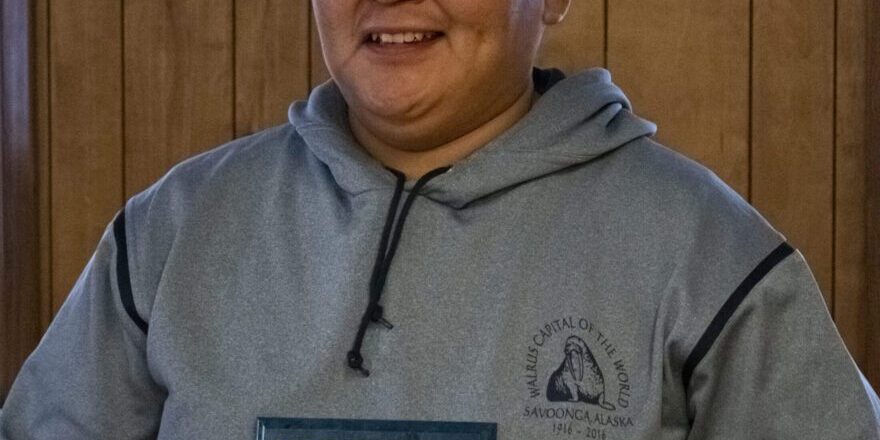Scott Kingeekuk, the primary Water Plant Operator in the village of Savoonga, has been named Alaska Rural Water Association’s Wastewater Operator of the Year.
KNOM’s JoJo Phillips reports on how Kingeekuk positively impacts his community:
Two weeks ago, a representative from the Alaska Native Tribal Health Consortium (ANTHC) traveled to Savoonga to personally hand deliver the award.
“This nomination is statewide, and they were so impressed by the report and by Scott’s abilities that he actually won the Wastewater Operator of the Year.”
– Chris Cox, manager for ANTHC’s Utility Collaborative
Running Savoonga’s water and sewer system is no small task. Kingeekuk and his crew are responsible for servicing the village’s water plant, the sewage lagoon, and handling repairs for Savoonga’s 600 residents. There are approximately 150 serviced buildings, all of which require regular attention from the village’s four operators.
Kingeekuk credits his success to two factors:
“Hard work and I attribute a lot of it to my crew, I have a good crew. I really couldn’t do a lot without my guys.”
Kingeekuk has been working as a wastewater operator since 2011, when the former Primary Operator needed a hand. At that point in time, Kingeekuk was focused on a completely different mechanical skill.
“I actually went to a motorcycle mechanic’s institute in AZ. I grew up on small engine repairs my older brothers brought me up on. I’ve always had a mechanical background.”
Although he lacked formal experience, Kingeekuk learned on the job and eventually was promoted several years later. He says having a steady job in the remote island-community is not something he takes for granted.
“There’s a small economy in Savoonga. It’s either the school, the store, the city, or the tribe for any kind of work. It’s nice to have a full-time job.”
Despite this, operating the water plant can be mentally and physically taxing. Kingeekuk has considered leaving the position before.
“At some point I did burn out and want to quit. Partly because our rate of pay was pretty low. I started at 16$ an hour. Just a couple years ago they were able to go back and take a look at the rate of pay with operators in Alaska, and they were able to bring our rate of pay substantially up.”
Even with increased pay, Kingeekuk sees the future as uncertain. In particular, he is worried about the changing climate and its effect on Savoonga’s infrastructure.
“As you know, we’re hit with climate change pretty good. It’s a lot warmer and the permafrost is thawing out underground. It’s sinking.”
A sinkhole has opened up near the village’s lagoon and is threatening to damage Savoonga’s sewer lines. Kingeekuk doesn’t believe it will be feasible to move the equipment below ground. He and his crew use wood pilings but these are temporary measures, like a band aid on a deep wound.
“We try to keep up with it, with pilings. It’s an annual thing.”

Photo: JoJo Phillips
As Kingeekuk has described, rural water operators play vital roles in their respective villages. During the awards’ presentation ANTHC’s Cox was sure to emphasize how important Kingeekuk and his crew are to their community.
“Operators here are great. Some of the best in the region. They keep the toilets flushing, they keep the water pressure good, and the guys here know what needs to be done.”
Image at top: Savoonga’s Scott Kingeekuk accepts award for Wastewater Operator of the Year. Photo: JoJo Phillips




